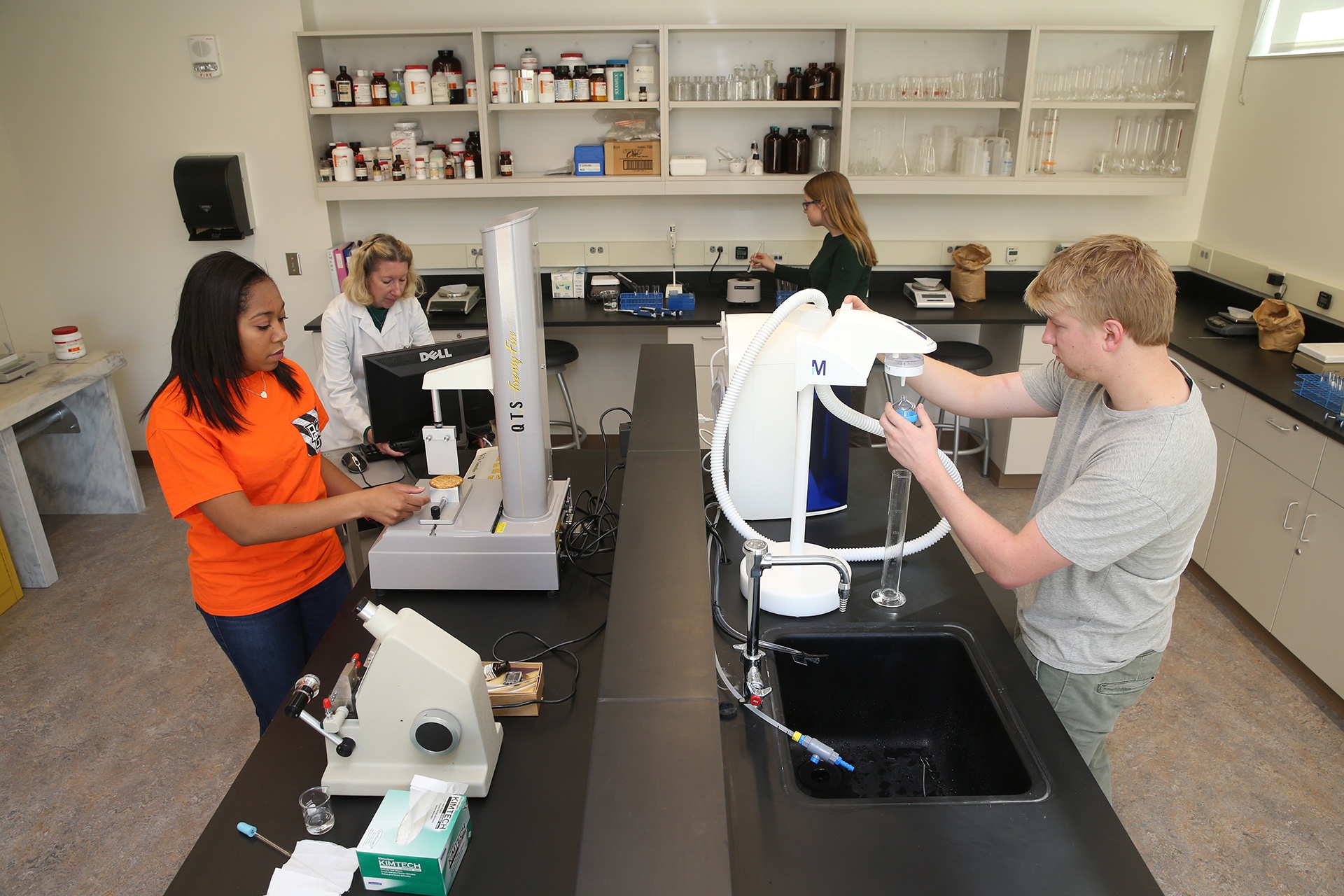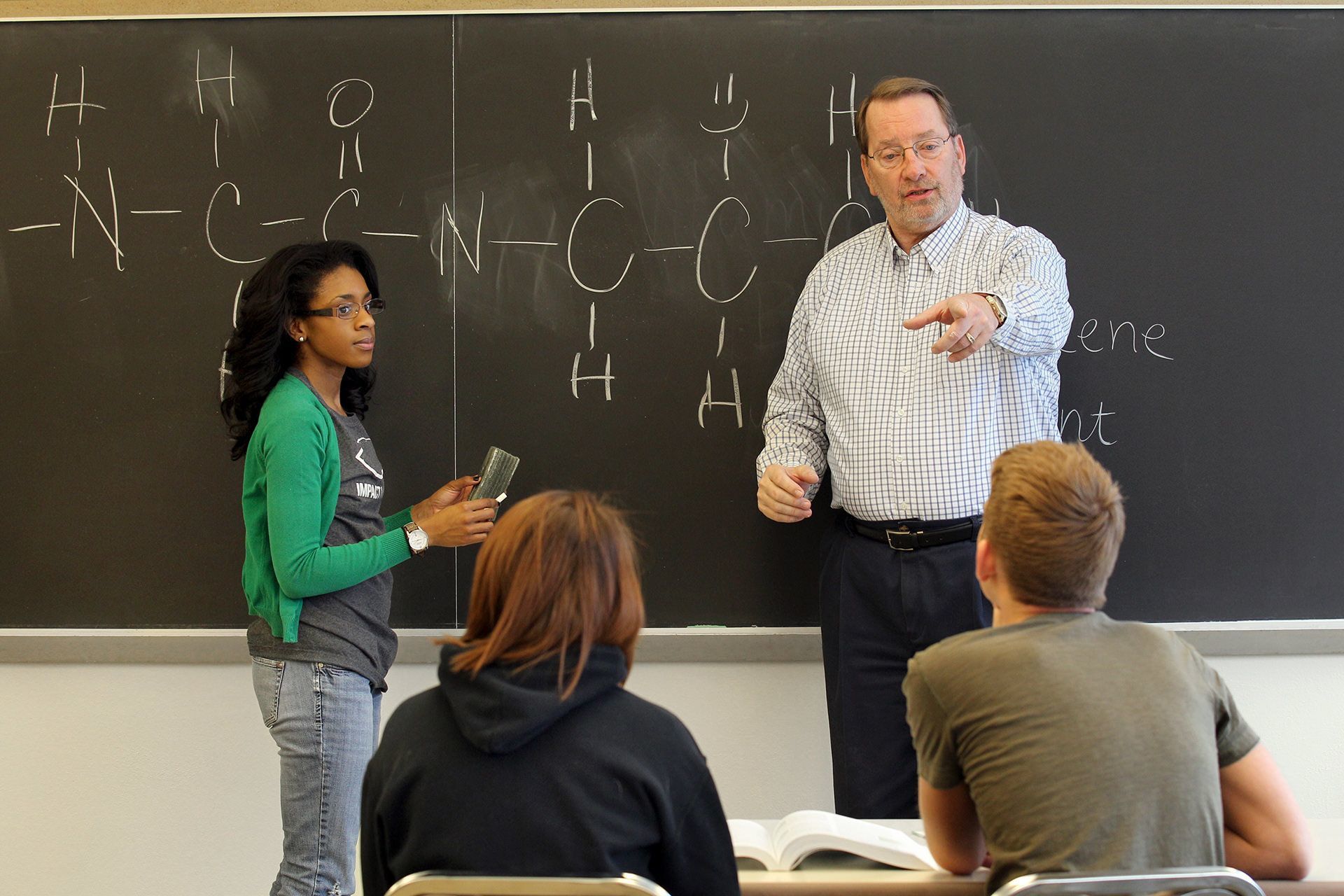Nationally recognized for student experience
The Wall Street Journal

Bachelor of Science in Nutrition Sciences (BSNS)
Minor
Nutrition Sciences
Feed your passion for health and wellness with a Bachelor of Science in Nutrition Sciences (BSNS) from Bowling Green State University.
This program incorporates coursework in biochemistry, physiology and food science. It is excellent preparation for admission to professional programs, such as medical or dental school. Nutrition sciences majors develop advanced scientific skills and the kind of analytical thinking that opens doors to prestigious graduate programs and thriving careers in the food and pharmaceutical industries.
A bachelor’s degree in nutrition sciences is not just about studying food. It’s about helping to fuel a healthier, more sustainable future. Delve into the science of nutrition through:
- Immersive laboratory experiences
- Innovative research opportunities
- Expert faculty mentorship
The BGSU nutrition science degree program is structured to build your expertise in the biological and chemical processes that govern how nutrients interact with the human body – knowledge that’s increasingly vital in today’s health-conscious world.
BGSU also offers a minor in nutrition and foods.
Why study nutrition sciences at BGSU in Ohio?
- Distinguished faculty. Department of Public and Allied Health faculty are highly regarded experts. Many lead active research programs and maintain industry connections that can significantly enhance your educational experience and outcomes.
- Comprehensive curriculum. We balance the foundational sciences, such as biochemistry, physiology and microbiology, with specialized nutrition topics, such as principles and practice of food protection, experimental foods and advanced nutrition.
- Modern facilities. Laboratory experience is paramount within the nutritional science degree program. BGSU offers opportunities to gain hands-on experience with laboratory instrumentation and to develop research skills in a variety of laboratory settings.
- Pathway to advanced credentials. This research-oriented degree is excellent preparation for admission to top professional schools for medicine, dentistry or pharmacy. Some students also pursue graduate studies in biomolecular sciences or the Master of Food and Nutrition at BGSU.
- Geographic advantages. BGSU offers proximity to thriving urban centers (with an abundance of internship opportunities) and sprawling agricultural regions (with close connections to food production systems).
- Active community engagement. Undergraduate students have opportunities to collaborate with both internal and external partners in a variety of settings.
Nutrition sciences graduates have one of the lowest unemployment rates in the U.S. by college major – 0.4%.
#1 public university in Ohio for career prep
The Wall Street Journal
Career - what can you do with a nutrition sciences degree?
Our rigorous curriculum provides the perfect scientific foundation for your ambitions – whether you’re driven to revolutionize food product development, conduct groundbreaking nutritional research or prepare for medical school or dental school.
Diet-related health issues continue to rise globally. Expertise in nutrition sciences is increasingly valued across a variety of sectors, including healthcare, industry and public policy.
The primary goal of many students in the Bachelor of Science in nutrition program is pursuit of advanced study. A nutrition science degree lays the perfect foundation for those pursuing:
- Medical school
- Dental school
- Physician assistant programs
- Master’s degrees in specialized nutrition fields
- Doctoral studies in food and nutrition sciences
For those specifically seeking a graduate degree in food and nutrition sciences or related fields, BGSU offers:
- The Master of Food and Nutrition (MFN)
- A food and nutrition graduate certificate – a 15-credit hour certificate that can be completed 100% online. Students pursuing other allied health professions and graduate degree programs (public health, human movement sport and leisure studies, biological sciences, etc.) often combine their program with this certificate.
Graduates are also ready for careers as nutrition specialists and food scientists in the food, nutrition and pharmaceutical industries. They work within the areas of research, development, quality assurance and sales/marketing. They help to develop new food products, research food safety, inspect food facilities and/or apply scientific principles to food processing, manufacturing and food packaging.
Career paths
- Food scientist
- Food product developer
- Food quality control specialist
- Food safety auditor
- Doctor (with additional education)
- Dentist (with additional education)
Quick Facts from the Bureau of Labor Statistics
Curriculum
The Bachelor of Science in Nutrition Sciences at BGSU is a research-focused program primarily designed for students pursuing advanced degrees or careers in nutrition research, food science and related biological sciences.
The BSNS curriculum emphasizes intensive study of the physical and biological sciences, with core requirements in human nutrition and food science. Students complete:
- 35 credit hours of core program courses (Nutritional Biochemistry, Introduction to Human Nutrition, Advanced Nutrition, etc.)
- 64-65 credit hours of supportive requirements. These include comprehensive minors in both biology and chemistry, plus coursework in physics, mathematics and statistics.
Graduates of the nutrition sciences undergraduate program will be able to:
- Demonstrate knowledge of biological, chemical and physical sciences concepts and apply these concepts to food and nutrition science.
- Use critical thinking and quantitative analysis to investigate food and nutrition science problems.
- Demonstrate effective oral and written scientific communication skills.
- Use a variety of laboratory techniques and instruments to investigate food and nutrition science problems.
This rigorous scientific foundation prepares students for graduate studies or careers in university research, industry or government scientific positions.

Sample courses
- Experimental Foods
- Fundamentals of Food Science
- Life Cycle Nutrition: Pregnancy to Adolescence
- Nutritional Assessment and Counseling
- Principles and Practice of Food Protection
- Research Methods in Nutrition, Foods & Dietetics
#1 university in Ohio – big or small, public or private – students would choose again
The Wall Street Journal
The nutrition sciences program is part of the Department of Public and Allied Health in the BGSU College of Health and Human Services.
Accreditation
Bowling Green State University [BGSU] is accredited by the Higher Learning Commission. BGSU has been accredited by the Higher Learning Commission since 01/01/1916. The most recent reaffirmation of accreditation was received in 2022-2023, with our next reaffirmation of accreditation scheduled for 2032-2033. Questions should be directed to the Office of Institutional Effectiveness.
Request Information
Updated: 08/08/2025 03:25PM

